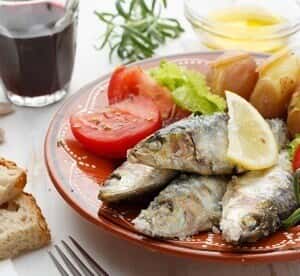
The Mediterranean diet can lower the likelihood of heart attacks and strokes, as the PREDIMED trial demonstrated (New England Journal of Medicine, April 4, 2013). People who follow such a diet rich in vegetables, fruit, fish and legumes are also less likely to develop type 2 diabetes (Journal of Nutrition, online March 6, 2016). This dietary pattern also protects people with diabetes from retinopathy. Diabetic retinopathy may cause vision loss in the working age population.
How Does a Mediterranean Diet Affect Retinopathy?
The PREDIMED study tested the effects of a Mediterranean-style eating pattern. The researchers conducted this experiment in Spain between 2003 and 2009. Roughly 7,500 people participated. None had clear signs of cardiovascular disease when the study began, but all were at risk for heart attacks because of smoking, diabetes, high blood pressure, obesity or elevated LDL cholesterol.
The PREDIMED Study:
One group of participants was assigned to follow a standard low-fat diet without adding anything special. The other two groups received either a large handful of nuts daily or 4 tablespoons of extra-virgin olive oil every day.
During the six year follow-up time frame, 3,600 subjects had type 2 diabetes. Those among them who got the most omega-3 fatty acids from fish in their diets were half as likely to develop diabetic retinopathy. This condition can lead to blindness. Whether fish oil supplements would be as helpful is not clear.
JAMA Ophthalmology, Aug. 18, 2016
How Do You Eat Mediterranean Style?
The Mediterranean diet pattern de-emphasizes processed foods, red meats and sweets. Vegetables, fruits, fish, whole grains, nuts and legumes are plentiful. Olive oil, preferably extra-virgin olive oil, is the primary fat used in cooking and on salads. Mediterranean cooks also use herbs and spices such as basil, rosemary and thyme generously.
If you would like guidelines on following such a diet, you can find them in our book, The People’s Pharmacy Quick & Handy Home Remedies.

